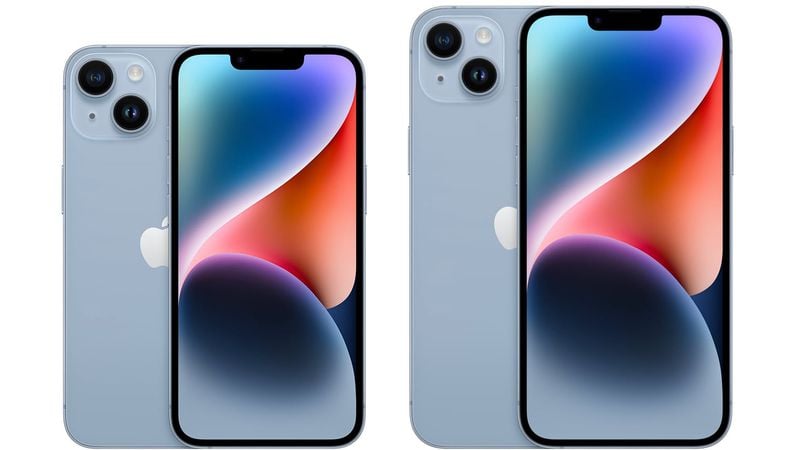
Should You Buy an iPhone 14?
The iPhone 14 is a prior-generation iPhone from 2022, and it is two years older than the flagship iPhone 16 models. You'll save $200 choosing the iPhone 14 over the iPhone 16, but it's probably not worth it at this point given the many advances Apple has introduced in the last few years.
Compared to the iPhone 16, the iPhone 14 lacks the latest technology, offering shorter battery life, less advanced camera technology, a slower chip, the Dynamic Island, a USB-C port, Ultra Wideband 2, and more.
If you're looking to get a good deal on an iPhone, we track all of the best iPhone sales on iPhone 14, iPhone 15, and iPhone 16 models.
iPhone 14 and iPhone 14 Plus Features Guide
Contents
- Should You Buy an iPhone 14?
- iPhone 14 and iPhone 14 Plus Features Guide
- Pricing and Availability
- Reviews
- Design
- Display
- A15 Bionic Chip
- TrueDepth Camera and Face ID
- Dual-Lens Rear Camera
- Battery Life
- 5G Connectivity
- Emergency SOS via Satellite
- Crash Detection
- Bluetooth, WiFi, NFC, GPS, and U1
- MagSafe
- iPhone 14 Timeline
The iPhone 14 and iPhone 14 Plus are prior-generation flagship iPhone, which were initially sold alongside the iPhone 14 Pro and iPhone 14 Pro Max, both of which have been discontinued. The iPhone 14 and iPhone 14 Plus are available as lower-cost alternatives alongside the iPhone 16 and iPhone 15 lineups.
Apple did away with the "mini" iPhone in 2022, and the iPhone 14 models come in 6.1- and 6.7-inch sizes. The 6.7-inch iPhone 14 is called the "iPhone 14 Plus," harkening back to the iPhone 8 and 8 Plus and prior generations. Apple's iPhone 14 models are identical in design to the iPhone 13 models, featuring flat edges, an aerospace-grade aluminum enclosure, and a glass back that enables wireless charging.
The iPhone 14 models come in blue, purple, midnight, starlight, and (PRODUCT)RED, plus Apple added a yellow color in March 2023. The iPhone 14 and 14 Plus continue to have a notch at the top of the display that houses the TrueDepth camera. Like the iPhone 13 models, the iPhone 14 and iPhone 14 Plus include Super Retina XDR OLED displays that support 1200 nits peak brightness, a 2,000,000:1 contrast ratio, Dolby Vision, and True Tone support for matching the white balance of the display to the lighting in the room. There is no ProMotion display technology available in the standard iPhone 14 models, with this feature limited to the Pro models.
A durable Ceramic Shield front cover protects the iPhone's display from bumps and drops, and the iPhone 14 models are IP68 water resistant, allowing them to withstand a depth of 6 meters for up to 30 minutes.
Apple is using the same A15 chip that was in the iPhone 13 Pro models for the iPhone 14 models, but there is an updated internal design that allows for better thermal performance. The A15 chip offers a 6-core CPU, a 5-core GPU, and a 16-core Neural Engine.
There's an updated 12-megapixel Wide camera that features a larger sensor, an ƒ/1.5 aperture, and larger 1.9 µm pixels for improved performance in low-light, plus there's sensor-shift optical image stabilization. Apple also added an updated TrueDepth camera with an ƒ/1.9 aperture, and while the Ultra Wide lens didn't get improvements, the Photonic Engine improves low-light photography across all of the iPhone 14 cameras.
Using a combination of hardware and software, the Photonic Engine improves low-light performance up to 2x on the Ultra Wide camera, 2x on the TrueDepth camera, and 2.5x on the Wide camera. The Photonic Engine expands on Deep Fusion and provides impressive detail while preserving subtle textures and providing improved color.
For video, there's an Action mode that provides smooth-looking video with better image stabilization than ever before. Action mode is able to adjust to significant shakes, motion, and vibrations, even when video is captured in the middle of action. Cinematic mode has been improved and is available in 4K at 30 fps and 4K at 24 fps. The True Tone flash is 10 percent brighter with better uniformity for more consistent lighting.
The iPhone 14 models include a dual-core accelerometer that can measure up to 256Gs, and the accelerometer and a high dynamic range gyroscope power a Crash Detection feature that can automatically contact emergency services if you're in a serious accident and can't reach your iPhone. Apple also uses other sensors to power this feature, so the barometer detects changes in cabin pressure, the GPS watches for rapid speed changes, and the microphone can listen for car crash noises.
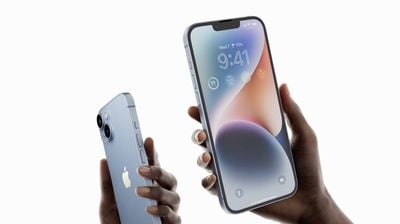
Apple also added Emergency SOS via satellite, an option that allows the iPhone 14 to connect directly to satellites for communication purposes in emergency situations when WiFi and cellular are not available. Emergency SOS via satellite works in open areas with few trees, and it allows users to send texts to emergency personnel. It is free for two years and works in the U.S. and Canada. Satellite connectivity can also be used to share your location with friends and family in Find My when you're out hiking or camping in remote areas.
As with the iPhone 13 models, the iPhone 14 models support 5G connectivity (sub-6GHz and mmWave in the United States), and they use a new Qualcomm X65 modem. In the United States, iPhone models ship without a physical SIM card as carriers now use eSIM.
Battery life has been improved with the iPhone 14, and it lasts an hour longer than the iPhone 13. With its larger size, the iPhone 14 Plus has even longer battery life than the iPhone 14. iPhone 14 lasts for up to 20 hours when watching video, while iPhone 14 Plus lasts for up to 26 hours when watching video.
The iPhone 14 models are available in 128GB, 256GB, and 512GB storage capacities. MagSafe charging up to 15W continues to be supported, and fast charging over Lightning is available with a 20W or higher charger. The iPhone 14 and 14 Plus also support WiFi 6 and Bluetooth 5.3.
Note: See an error in this roundup or want to offer feedback? Send us an email here.
Pricing and Availability
iPhone 14 pricing starts at $599 for 128GB of storage, while pricing on the iPhone 14 Plus starts at $699 for 128GB of storage. These prices are $200 discounts from their original pricing at launch, reflecting the older technology and features. Additional storage is available for higher prices. iPhone 14 and iPhone 14 Pro models can be purchased from the online Apple Store, Apple retail stores, and from third-party retailers, who often have discounted prices and carrier deals.
As of December 2024, Apple is no longer selling the iPhone 14 models in the European Union.
Reviews
Initial reviews of the iPhone 14 and iPhone 14 Plus were positive, but they highlighted that the device is only an incremental upgrade compared to the iPhone 13, featuring the same overall design, the same A15 Bionic chip with an additional GPU core, and slight improvements to the rear and front cameras.
Display
The display on the standard iPhone 14 is nearly identical to the one on the iPhone 13, with The Verge's Allison Johnson saying it's a good display but noting that there are other options offering more advanced displays with 120Hz refresh rates at around the same price.
It's a good screen, but the competition is running laps around Apple here. Android phones from the flagship class all the way to the $350 Samsung A53 5G offer screens with 120Hz refresh rates. It's not a deal-breaker, but it's an area where it feels like the standard iPhone is overdue for an update.
Performance
The iPhone 14 features the same A15 Bionic chip that powered the iPhone 13 Pro and iPhone 13 Pro Max. Compared to the A15 Bionic chip in last year's standard iPhone 13, the iPhone 14's chip features one additional GPU core. CNET said the iPhone 14 is "speedy" with fluid animations and no performance hiccups.
The iPhone 14 also includes an improved internal design that better manages heat, allowing users to play high-intensive games for longer without the device overheating. Engadget said the device managed to stay "cool to the touch" during gaming and that the phone remains capable regarding performance.
The iPhone 14 may use last year's A15 Bionic processor, but it's still a capable phone that holds its own against this year's flagships. My feverish rounds of Royal Match while messaging fellow reviewers my thoughts on the iPhone 14 Pro all happened smoothly, and in general the phone stayed cool to the touch. It got warm when I repeatedly tested the selfie camera’s autofocus in low light, but didn't get alarmingly hot.
Battery Life
The standard iPhone 14 features a slightly larger battery than the standard iPhone 13. Apple is promising up to 20 hours of video playback and up to 80 hours of audio playback for the iPhone 14, making similar claims as it did for the iPhone 13 last year.
The Verge said that in real-world testing, the iPhone 14 ended the day with around 40% to 50% of battery life remaining, adding that while it's difficult to compare to the iPhone 13 given limited testing and varying usage, it should be sufficient for most users.
In the real world, after three to four hours of screen-on time, I had between 40 and 50 percent charge at the end of the day. Whether that's substantially better than the already quite excellent iPhone 13 is hard to say, but it’s good enough to get most people through a full day, and that's what counts.
Cameras
Both the front and rear cameras on the iPhone 14 received some upgrades. On the front, the selfie camera is a 12MP camera that features autofocus. Apple says the camera delivers up to 2x better low-light photos compared to the iPhone 13 thanks to its larger aperture.
On the back, the iPhone 14 features the same dual-camera setup as the iPhone 13 but now includes improved Main and Ultra Wide lenses. The new Main camera has an ƒ/1.5 aperture that allows 49% more light to enter every shot. The Main camera also benefits from a workflow that Apple calls the Photonic Engine. The Photonic Engine merges multiple pixels from multiple exposure levels to deliver brighter and "more lifelike" colors in low-light situations.
CNET said the iPhone 14 takes acceptable photos in low-light conditions and handles details well.
And in my tests, the iPhone 14 takes great photos and videos. I was able to get a respectable snap, even when the lighting wasn't good. Check out the photo below of a dog that I took in the not-so-bright interior of a coffee shop. Notice how well the 14 captures the texture and detail in the dog's fur. It also did a good job of freezing the action even though the dog was moving his head as I was taking the photo.
For videos, the iPhone 14 includes an Action mode that delivers stabilized video when active.
Design
The iPhone 14 is essentially identical to the iPhone 13, with no design updates aside from new colors. It features the same flat-sided design with squared-off edges that Apple used for last year's iPhones.
Apple's iPhone 14 measures in at 6.1 inches, while the larger-screened iPhone 14 Plus measures in at 6.7 inches, the same size as the iPhone 14 Pro Max.

The iPhone 14 models feature an all-glass front and colorful glass back framed by a color-matched aerospace-grade aluminum frame. A notch at the top of the display includes the TrueDepth camera, speaker, and microphone, with Apple keeping the notch around for its more affordable devices. The iPhone 14 Pro and Pro Max no longer use a notch, and instead have a "Dynamic Island."
A set of antenna bands can be seen on the top and sides of the phone, with a power button on the right and volume buttons and a silence switch on the left. Underneath the power button, there's a 5G mmWave antenna, but this is limited to iPhone 14 models sold in the United States.

There are speaker holes and microphones at the bottom of the iPhone 14 and 14 Plus, along with a Lightning port for charging purposes. Apple has eliminated the SIM slot in the United States, as it has transitioned to eSIM.
The camera bump at the back of the iPhones is unchanged, featuring a diagonal lens setup, a True Tone flash, and a microphone.
The iPhone 14 measures in at 5.78 inches tall (146.7mm), 2.82 inches wide (71.5mm), and 0.31 inches deep (7.80mm), identical to the iPhone 13 except for the thickness. It is 0.15mm thicker, which is something that most people will not notice. The iPhone 14 weighs 6.07 ounces (172 grams), so it is just a bit lighter than the iPhone 13.
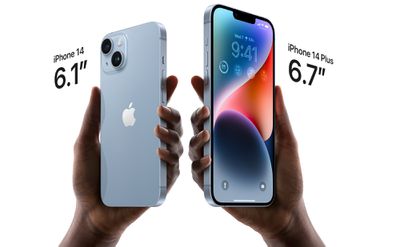
The iPhone 14 Plus measures in at 6.33 inches tall (160.8mm), 3.07 inches wide (78.1mm), and 0.31 inches thick (7.80mm). It weights in at 7.16 ounces (203 grams).
No iPhone 14 mini
Last year, Apple sold a 5.4-inch iPhone 13 mini alongside the 6.1-inch iPhone 13, but this year, there is no 5.4-inch iPhone. The iPhone 12 mini and iPhone 13 mini did not sell well according to analyst estimates, leading Apple to discontinue that particular size.
Apple now offers the iPhone in 6.1- and 6.7-inch sizes, which are the same sizes available for the iPhone 14 Pro and iPhone 14 Pro Max. This is the first time that Apple has offered a larger version of a standard iPhone, as in past years, the 6.7-inch size was limited to "Pro" versions of the iPhone.
Colors
Apple has been offering its standard iPhone lineup in a range of bright colors for several years now. The iPhone 14 models come in Blue, Purple, Midnight, Starlight, (PRODUCT)RED, and Yellow.
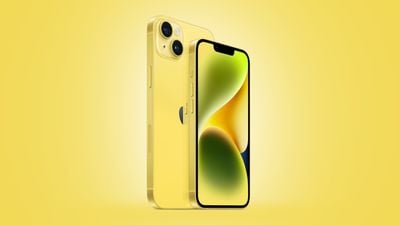
The yellow color was announced in March 2023 and it is a new addition to the color lineup. Apple often does a spring release with a new iPhone shade, and this year, yellow was the spring color option. Yellow is available for the iPhone 14 and 14 Plus.
Water and Dust Resistance
The iPhone 14 and 14 Plus have an IP68 rating for resistance to water and dust intrusion. The smartphones are able to withstand a depth of up to six meters (19.7 feet) for up to 30 minutes.
In the IP68 number, the 6 refers to dust resistance (and means the iPhone 14 can hold up to dirt, dust, and other particulates), while the 8 pertains to water resistance. IP6x is the highest dust resistance rating that exists. With the IP68 rating, the iPhone 14 can hold up to splashes, rain, and accidental water exposure, but intentional water exposure should be avoided.
Water and dust resistance are not permanent conditions, according to Apple, and can deteriorate over time as a result of normal wear. Apple's standard warranty does not cover liquid damage, which means it's best to use caution when it comes to liquid exposure.
Display
There have been no updates to the display with the iPhone 14 models compared to the prior-generation iPhone 13 models. The iPhone 14 and 14 Plus feature an OLED Super Retina XDR display with a 2,000,000:1 contrast ratio for blacker blacks and brighter whites, and up to 1200 nits peak brightness for HDR photos, videos, TV shows, and movies. Typical max brightness is 800 nits for the standard iPhone 14 models, 200 nits lower than the 14 Pro models.

The iPhone 14 has a resolution of 2532 by 1170 with 460 pixels per inch, while the iPhone 14 Plus has a resolution of 2778 by 1284 with 458 pixels per inch.
Wide color support offers vivid, true-to-life colors, and True Tone matches the white balance of the display to the ambient lighting for a paper-like viewing experience that's easier on the eyes. There's also a fingerprint-resistant oleophobic coating and support for Haptic Touch, which provides haptic feedback when interacting with the display.
The display is protected by a "Ceramic Shield" material that is made by infusing nano-ceramic crystals into glass. The ceramic crystals were manipulated to optimize for clarity while maintaining toughness, with the display created in partnership with Corning. According to Apple, Ceramic Shield is tougher than any smartphone glass, with a dual-ion exchange process ensuring protection against scratches and everyday wear and tear.
The iPhone 14 and 14 Plus do not support the ProMotion 120Hz refresh rate or the Always-On display technologies available on the iPhone 14 Pro and Pro Max.
A15 Bionic Chip
The iPhone 14 and 14 Plus feature the same A15 chip that was used in the iPhone 13 Pro and Pro Max, and this is the first time that Apple has not updated the A-series chip across the iPhone lineup. The iPhone 14 Pro and Pro Max have an A16 chip, but Apple did not use the technology in the 14 and 14 Plus.

The A15 has a 6-core CPU with two performance cores and four efficiency cores, along with a 5-core GPU. Apple last year only used the 5-core GPU version of the A15 in the iPhone 13 Pro models, and a 4-core GPU version was in the iPhone 13 and 13 mini, so there are still improvements comparatively.
While CPU performance is about the same between the iPhone 13 and iPhone 14, there are some modest improvements to the GPU. Apple is also using an updated internal design that provides better thermal efficiency.
Neural Engine
The 16-core Neural Engine in the A15 chip is able to perform up to 15.8 trillion operations per second, and it powers features like Cinematic mode and Smart HDR 4.
RAM
The iPhone 14 and 14 Plus feature 6GB RAM, up from 4GB in the prior-generation models.
Storage Space
All iPhone 14 models start with 128GB of storage, and the iPhone 14 and iPhone 14 Plus can be ordered with up to 512GB storage space. That's half the maximum storage space of the iPhone 14 Pro models, which come with up to 1TB.
TrueDepth Camera and Face ID
The iPhone 14 and 14 Plus continue to use Face ID, the facial recognition system first introduced in 2017. Apple eliminated the notch with the iPhone 14 Pro models, but the standard iPhone 14 models continue to feature a display notch for the TrueDepth camera hardware.
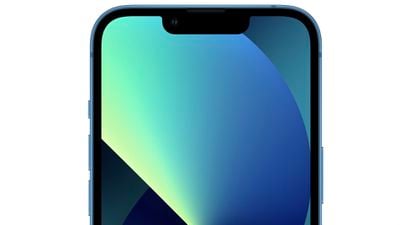
Face ID is used across iOS for unlocking the iPhone, allowing access to third-party passcode-protected apps, confirming app purchases, authenticating Apple Pay payments, and more.
Face ID works through a set of sensors and cameras. A Dot Projector projects tens of thousands of invisible infrared dots onto the surface of the skin to create a 3D facial scan that maps the curves and planes of each face, with the scan read by an infrared camera.
The facial depth map is relayed to the A15 chip where it is transformed into a mathematical model that the iPhone uses to authenticate identity. Face ID works in low light and in the dark, and with hats, beards, glasses, sunglasses, scarves, and other accessories that partially obscure the face. As of iOS 15.4, Face ID also works with a mask.
Front-Facing Camera Features
Apple's iPhone 14 models feature an updated 12-megapixel front-facing camera with an ƒ/1.9 aperture that is designed to let in more light than before for improved selfies and FaceTime video calls. It also features autofocus for the first time, which also improves image quality, and low-light selfies are 2x better.
The front-facing camera supports many of the same features as the rear cameras, including Night mode for selfies, Smart HDR 4, Dolby Vision HDR recording, Deep Fusion, and the new Photonic Engine, along with ProRes and the Cinematic mode for capturing videos with movie-like depth-of-field changes.
4K video recording, QuickTake video, Slo-mo video, Portrait mode, Portrait Lighting, and the Photographic Styles feature for selectively applying edits are also supported on the front-facing camera.
Dual-Lens Rear Camera
The iPhone 14 and 14 Plus are equipped with a dual-lens camera setup that features both a 12-megapixel Wide lens, which Apple now calls the "Main" lens, and a 12-megapixel Ultra Wide lens.
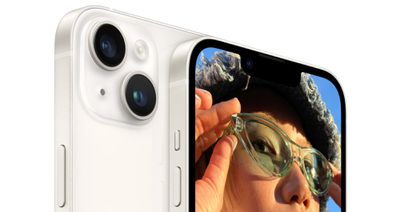
Apple has updated the Main camera with an ƒ/1.5 aperture, an improvement over the ƒ/1.6 aperture used in the iPhone 13 camera. The new lens, which also has a larger sensor, lets in more light for better improvement in poor lighting conditions. Apple says the new Main camera lets in 49 percent more light than the iPhone 13 camera.
The Ultra Wide camera has not been updated, and there is no Telephoto lens like there is with the 14 Pro and Pro Max. The iPhone 14 and 14 Plus are limited to 2x optical zoom out and digital zoom up to 5x.
Photonic Engine
The Photonic Engine is a new iPhone 14 software feature that builds on Deep Fusion, applying it earlier in the imaging process to provide more detail, preserve subtle textures, and improve the color in the photo.

Apple says that the Photonic Engine offers a "giant leap" for mid- to low-light photo performance in photos, both for the Main lens and the Ultra Wide lens. With Photonic Engine, you'll get up to 2.5x better low-light photos with the Main camera and 2x better low-light photos with the Ultra Wide camera.
Video Capabilities
The iPhone 14 and 14 Plus offer up to 4K video recording at 24, 25, 30, or 60 fps. HDR recording, ProRes video, slo-mo video, and time-lapse are all supported.
Apple added a new Action mode that's designed to provide smooth-looking video that ignores shakes, motion, and vibrations. Action mode records at up to 2.8K at 60 frames per second.
- iPhone 14: How to Use Action Mode to Capture Smooth Video
- iPhone 14: How to Optimize Action Mode for Low-Light Shooting
Other Camera Features
- Smart HDR 4 - Recognizes up to four people in a scene and optimizes contrast, lighting, and even skin tones for each person so everyone looks their best.
- Photographic Styles - Smart, adjustable filters that can do things like boost or mute colors without affecting skin tone. Styles apply selectively to an image, unlike a filter that's applied to the entire image. Photographic Styles include Vibrant (boosts colors), Rich Contrast (darker shadows and deeper colors), Warm (accentuates golden undertones), or Cool (accentuates blue undertones). Tone and Warmth are customizable for each style, so you can get the exact look that you want.
- Night mode - Takes a series of images over a few seconds and aggregates them to allow for photography in extreme low lighting situations. Night mode exposures are up to 2x faster with the Main iPhone 14 camera.
- Deep Fusion - Works in mid to low lighting conditions and brings out the texture and detail in the image.
- Portrait mode - Keeps the subject of the photo in focus while blurring the background.
- Portrait Lighting - Changes the lighting of Portrait mode photos with effects that include Natural, Studio, Contour, Stage, Stage Mono, and High-Key Mono.
- True Tone flash - True Tone flash is the built-in flash, and it is designed to match the ambient lighting so it doesn't throw off the white balance of the photo when used. The iPhone 14 flash is brighter and it has more consistent lighting.
- Panorama - Captures panoramic shots up to 63 megapixels.
- Burst mode - Allows a series of images to be captured all at once, which is good for high-action shots.
Battery Life
There is a 3,279mAh battery in the iPhone 14, which is a bit larger than the battery from the prior-generation iPhone 13. The iPhone 14 Plus has a 4,325mAh battery. The iPhone 14 offers up to 20 hours of battery life for video playback, up to 16 hours for streaming video playback, and up to 80 hours for audio playback, which is an improvement over the iPhone 13 by about an hour.
The iPhone 14 Plus offers up to 26 hours of video playback, up to 20 hours of streaming video playback, and up to 100 hours of audio playback. All iPhone 14 models are fast-charge capable and can charge up to 50 percent in 30 to 35 minutes with a 20W or higher power adapter.
5G Connectivity
The iPhone 14 models are equipped with a Qualcomm Snapdragon X65 modem that supports 5G connectivity. In the United States, iPhone owners can connect to both mmWave and sub-6GHz networks, while other countries are limited to sub-6GHz.
mmWave 5G networks are the fastest 5G networks, but mmWave is short-range and can be obscured by buildings, trees, and other obstacles, so its use is limited to major cities and urban areas along with venues like concerts, airports, and other places where a lot of people congregate.
Sub-6GHz 5G is more widespread and available in urban, suburban, and rural areas across the United States and other countries. For the most part, when you use a 5G network, you'll be using Sub-6GHz 5G. Sub-6GHz 5G is typically faster than LTE, especially when mid-band spectrum is used, but it isn't always the blazing fast 5G that you expect.
5G Bands
The iPhone 14 models in the United States support more than 20 5G bands. The following bands are supported:
- Sub-6GHz 5G - Bands n1, n2, n3, n5, n7, n8, n12, n14, n20, n25, n26, n28, n29, n30, n38, n40, n41, n48, n53, n66, n70, n71, n77, n78 n79
- mmWave 5G - Bands n258, n260, n261
LTE Bands
The iPhone 14 models continue to offer Gigabit LTE with 4x4 MIMO for connecting to LTE networks when 5G is unavailable. The following bands are supported:
- FDD-LTE - Bands 1, 2, 3, 4, 5, 7, 8, 12, 13, 14, 17, 18, 19, 20, 25, 26, 28, 29, 30, 32, 66, 71
- TD-LTE - Bands 34, 38, 39, 40, 41, 42, 46, 48, 53
Emergency SOS via Satellite
All iPhone 14 models can connect to satellites in emergency situations when cellular and WiFi connections are not available. Apple has designed the new Emergency SOS via satellite feature to allow the iPhone's antennas to connect to satellites operated by Globalstar.
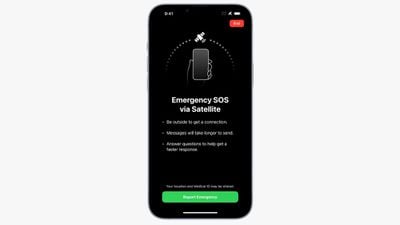
Satellite communications are available in emergency situations where you can't connect to WiFi or a cellular tower, and the feature is designed to be used in open spaces with few trees so the iPhone can connect to a satellite that's in the sky.
Apple has a walkthrough interface that instructs you how to hold the iPhone to connect to a satellite, and the company has developed a compressed messaging protocol because sending data via satellite can take minutes. In an area with no trees, a short message to emergency services can send in as little as 15 seconds.
Emergency SOS via satellite provides a series of important questions that you answer when it is activated, with these questions aimed at getting necessary details to emergency personnel as quickly as possible. The answers that you provide are sent directly to emergency services if text communication is supported in your area, or sent to relay centers staffed by Apple-trained specialists who can call emergency services on the user's behalf.
Satellite connectivity is mainly designed to allow users to contact emergency services in dire situations, but it can also be used to update your Find My location if you're camping or hiking off the grid, giving your family and friends peace of mind about where you are.
- iPhone 14: How to Demo or Use the Emergency SOS via Satellite Service
- How to Share Your Location via Satellite With Find My
Emergency SOS via satellite is free for all iPhone 14 users for two years, and Apple has not yet provided details on what it will cost in the future.
Crash Detection
There's a high dynamic range gyroscope and a dual-core accelerometer capable of detecting G-force measurements of up to 256Gs in the iPhone 14 models, and paired with other iPhone sensors like a barometer that can detect cabin pressure changes caused by deployed airbags, this new hardware enables a Crash Detection feature.
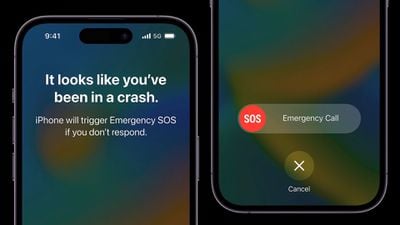
The iPhone 14 models can detect a severe car crash and automatically dial emergency services when the car's occupants are seriously injured or unable to reach their iPhone. Apple trained motion detection algorithms on more than a million hours of real-world driving and crash record data for accuracy purposes, and it has been proven to work in the real world. There are some issues with Crash Detection, as it has been mistaking roller coaster rides for car crashes in some instances.
The GPS in the iPhone is able to detect speed changes, and the microphone is able to recognize loud sounds associated with severe car crashes. Crash Detection is also available on the Apple Watch, and the iPhone and Apple Watch work together to contact emergency services when an accident occurs.
Bluetooth, WiFi, NFC, GPS, and U1
The iPhone 14 and 14 Plus support WiFi 6 (802.11ax) with 2x2 MIMO, and Bluetooth 5.3. There's an NFC chip with reader mode, and a U1 Ultra Wideband chip. The U1 provides improved spatial awareness, allowing iPhone 14 models to precisely locate other U1-equipped Apple devices.
The U1 chip can be used for precision tracking, such as when locating AirTags. It is also used for directional AirDrop and for interactions with the HomePod mini with a U1 chip. As for GPS, the iPhone 14 models support GPS, GLONASS, Galileo, QZSS, and BeiDou location services.
MagSafe
There continue to be MagSafe magnets in the back of the iPhone 14 models, with those magnets able to connect to the MagSafe charger and other magnetic accessories. Official MagSafe chargers from Apple and authorized third parties can wirelessly charge the iPhone 14 models at up to 15W.
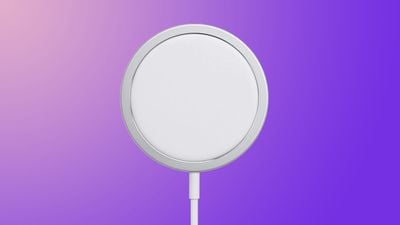
Qi2-based chargers are also available and can charge the iPhone 14 models at up to 15W, but standard Qi charging maxes out at 7.5W.

